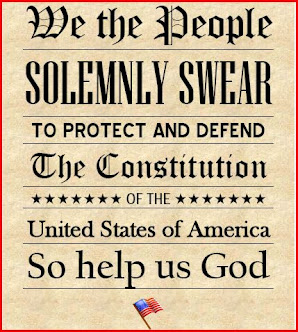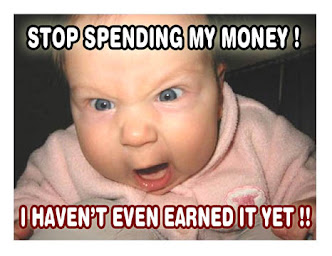IN DEFENSE OF RAND PAUL
The Rand Paul tempest in a teapot that has been unfolding for the past week has been a case study in how to sabotage a perfectly good, potentially highly successful campaign. A textbook case of snatching defeat from the jaws of victory, if you will. It's also a perfect example of the pointless depths the media will sink to in order to control the debate. Paul's commendable attempt at being open and transparent in his views seems to have backfired on him.
Mr. Paul won his primary by a landslide, there is no denying that. As of last Thursday, he was leading his democrat rival for the Kentucky Senate seat by a 25 point margin. He seemed to be a shoo-in for the seat come November. Even better, he was chosen over a GOP sponsored pick by the Tea Party, giving them some real electoral muscle and sending a message to the establishment that the run-of-the-mill candidates just weren't up to snuff.
Mr. Paul, and the Tea Party by extension, was flying high after the election. But then he went on MSNBC and did an interview with Rachel Maddow. Ms. Maddow went after Paul over a video interview with the Louisville Courier-Journal back in April (skip to the 59 minute mark for his comments). In the interview, Paul was asked if he would have voted for the Civil Rights Act of 1964. Suddenly, with a single question, this incredibly promising candidate is battling for his political life.
How this issue is pertinent to what is going on the country today is anyone's guess, but they sure did strike gold, didn't they?
Let's just try to put his comments in context - something the left is always clamoring for - before we continue. He told Maddow (and the Courier-Journal) that he would have tried to change the legislation. NOT that he would have voted against it, attempted to filibuster it or try to repeal it. His problem with the legislation was that the corrective behavior on this issue, solely at the private level, should have been consumer based, not federal intervention. Economic pressure to bring about change, not governmental mandates. Those businesses that continued to discriminate against people because of the color of their skin should have been boycotted by their customers until they changed their ways. It goes to the heart of the debate over how much the federal government should be allowed to intervene in our lives.
Maddow's attempts to say that he somehow condoned the violence of the era was ridiculous, but it is also pertinent to Paul's opinion. Yes, people were beaten for sitting at a lunch counter. The reason this happened was because of institutional racism in the form of Jim Crow laws. Police were not required to intervene in these cases, and when they did, it was in support of the businesses in question. After all, the people who were originally in violation of the law were the protesters, who, by law, could not sit at the counter. Making the black community equal in the eyes of the law was necessary to stop the beatings Maddow was so focused on. Ms. Maddow seems to have amnesia as to the role the police, state and local officials had in segregation. Certainly there were business owners who thought the Jim Crow laws were perfectly proper and fitting. No doubt there were also those who did not, but they were helpless to do anything about it because of the laws protecting such reprehensible actions.
What Mr. Paul advocated was removing the biased laws and allowing human decency to do the rest. The problem with the left is, they don't give people the chance to do what is right. They feel people must be taken by the hand and "guided" down the proper path. And let's not forget that it was democrats (the "Redeemers") who ran the South and enacted the Jim Crow laws.
Boiled down, he feels that institutions do not have the right to be racist or biased, but people do.
This is about more than just the Civil Right Act, though. Ms. Maddow had an agenda for that interview - corner Paul and paint him as a racist. This is classic Alinsky Rule #13 - 'Pick the Target, Freeze It, Personalize It and Polarize It.' What better way to do that than imply that he is racist? It's the indefensible accusation, after all. Haven't we all learned over the past two years that that's what it's really all about with these people? Bring it back to racism, because once they manage to label you that way, you will always be fighting it. You have to give her credit - she's certainly tenacious. She even managed, at the end of the interview, to add this little gem:
Dr. Rand Paul, Republican nominee for the United States Senate in Kentucky, where he'll be representing not only his own views about how to live but what kind of laws we should have in America....
That's the sum-up of the whole exercise - the big, flashing 'danger' sign the liberal media is desperate to illuminate - be careful, you idiot voters, this
Let's not forget that Mr. Paul is a libertarian at heart. The reason the Tea Party embraced him was because of his inherent distrust of federal intervention. This is often a problem with the libertarian viewpoint. It sometimes runs the risk of being taken to the extreme - borderline anarchy - or is perceived that way. Those views, in this climate of a hyper-nanny state, are total apostasy.
On one hand, Mr. Paul makes sense - desegregating public buildings, institutions and programs is certainly within the milieu of the federal government, but forcing a private business owner to serve people is not. And no, I do not think that businesses should not serve people because of the color of their skin - but I do think they have a right to withhold service, no matter how reprehensible their reason for it may be. But that is easily countered, because it is also MY right to take my business to someone who doesn't espouse those policies. Which is Mr. Paul's point. The problem with Paul's rationale is that, in a society where racism was the norm and had been for generations, would anyone have boycotted the places that refused to serve the black community? In a perfect world, we would all hope that basic human decency would win out over something as appalling as racial segregation, but, unfortunately, the Deep South in the 1960's was anything but perfect.
In the meantime, Mr. Paul has inadvertently created a media feeding frenzy. After all, nothing says "racist" like someone who doesn't agree with the Civil Rights Act! This is really a twofer for the liberal media. Not only do they get a golden opportunity to sink a republican senatorial campaign, but they also get to take the tea parties down a notch, too. No wonder the media has been semi-orgasmic in their coverage of the "controversy".
They are using fear to sink a very popular candidate - as if there have ever or will ever be any attempts to repeal the Civil Rights Act. Puhleeze. This also has the bonus of sucking the air out of the room and leaving no space to talk about other things, like the administration's lack of response to the Gulf oil spill, government unions' role in the collapse of the European union, the rank hypocrisy of our president signing a freedom of press act ten months into a moratorium on press conferences on his part, unemployment back up to 9.9%, the stock market's most recent roller-coaster impersonation, or the president's outright demagoguery of the Arizona immigration bill.
Who really knows how damaging this will be to Paul come November? The Courier-Journal most certainly is working this angle as much as possible, as is most of the left-wing neo-pravda media. They are happy to paint Paul as a racist by implication and spread the fear to Kentucky's black community that if he is voted into office, there is a chance segregation will take hold again. It is fear baiting at it's most crass.
That Mr. Paul didn't see this coming when he was talking about a 46 year old law that has no relevance in today's politics is worrying. This is settled law that had no pertinence to the current debate, and bringing it up should have set off some alarm bells for him. A more savvy politician would have seen the trap for what it was, especially coming from far-left media like the Courier-Journal and MSNBC. Of course, the main reason he gained the Tea Party endorsement was because he wasn't an entrenched, career politician who parses everything he says and makes no stands on any issues, relevant or not. He is a principled man who doesn't pull his punches. Perhaps he has learned from this episode that politics is a contact sport, and, as with all contact sports, strategy is required. Sometimes that means pulling a punch or two to save your energy for the real battles.















0 comments:
Post a Comment